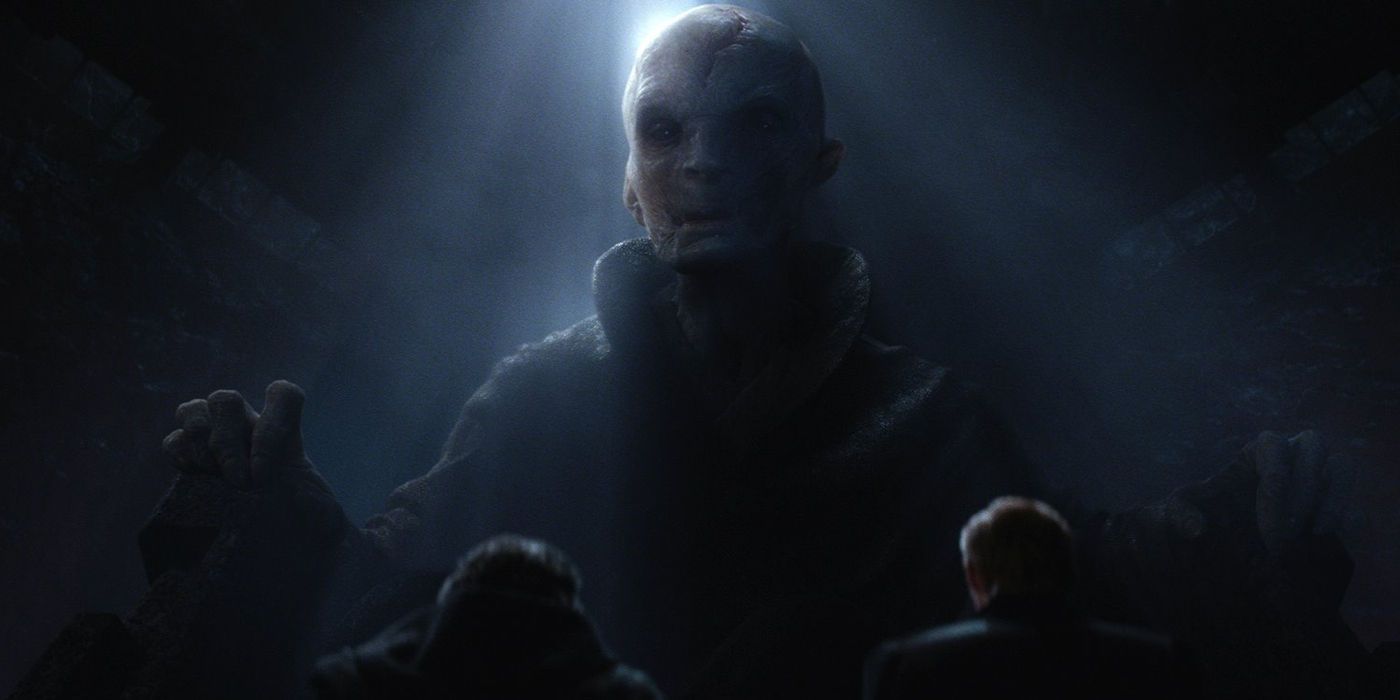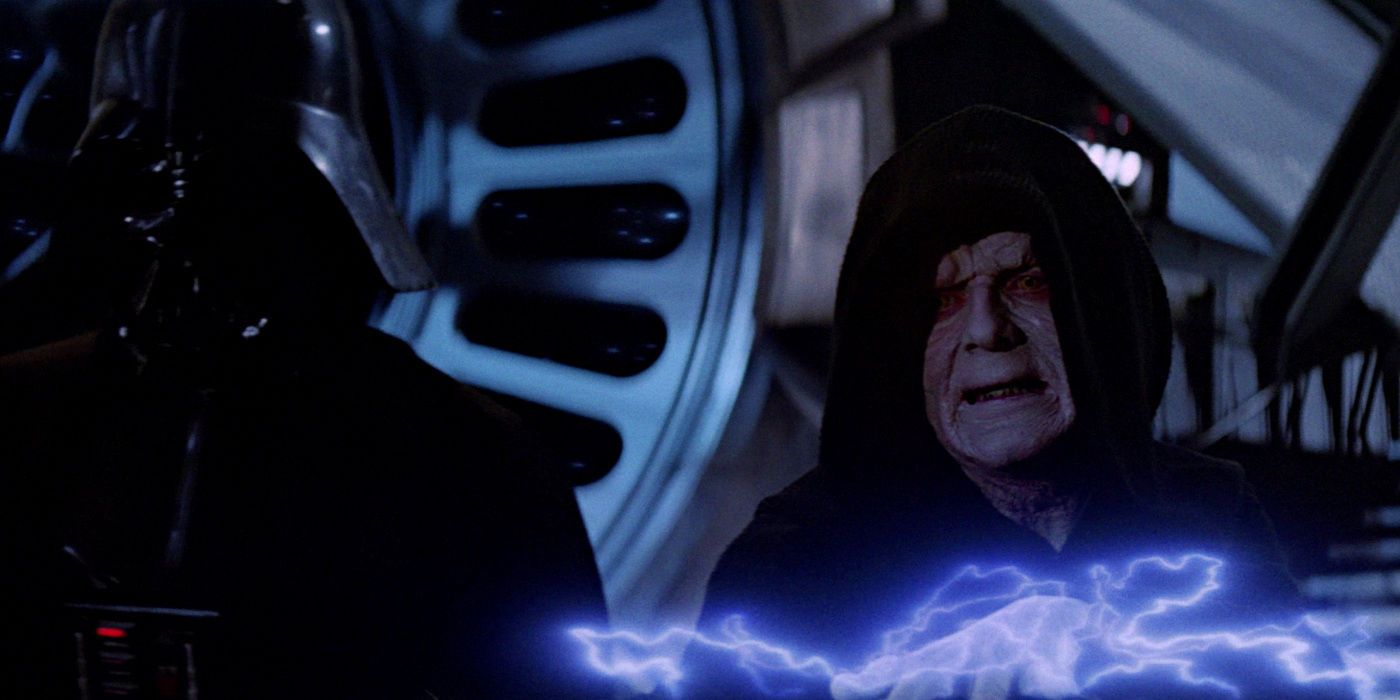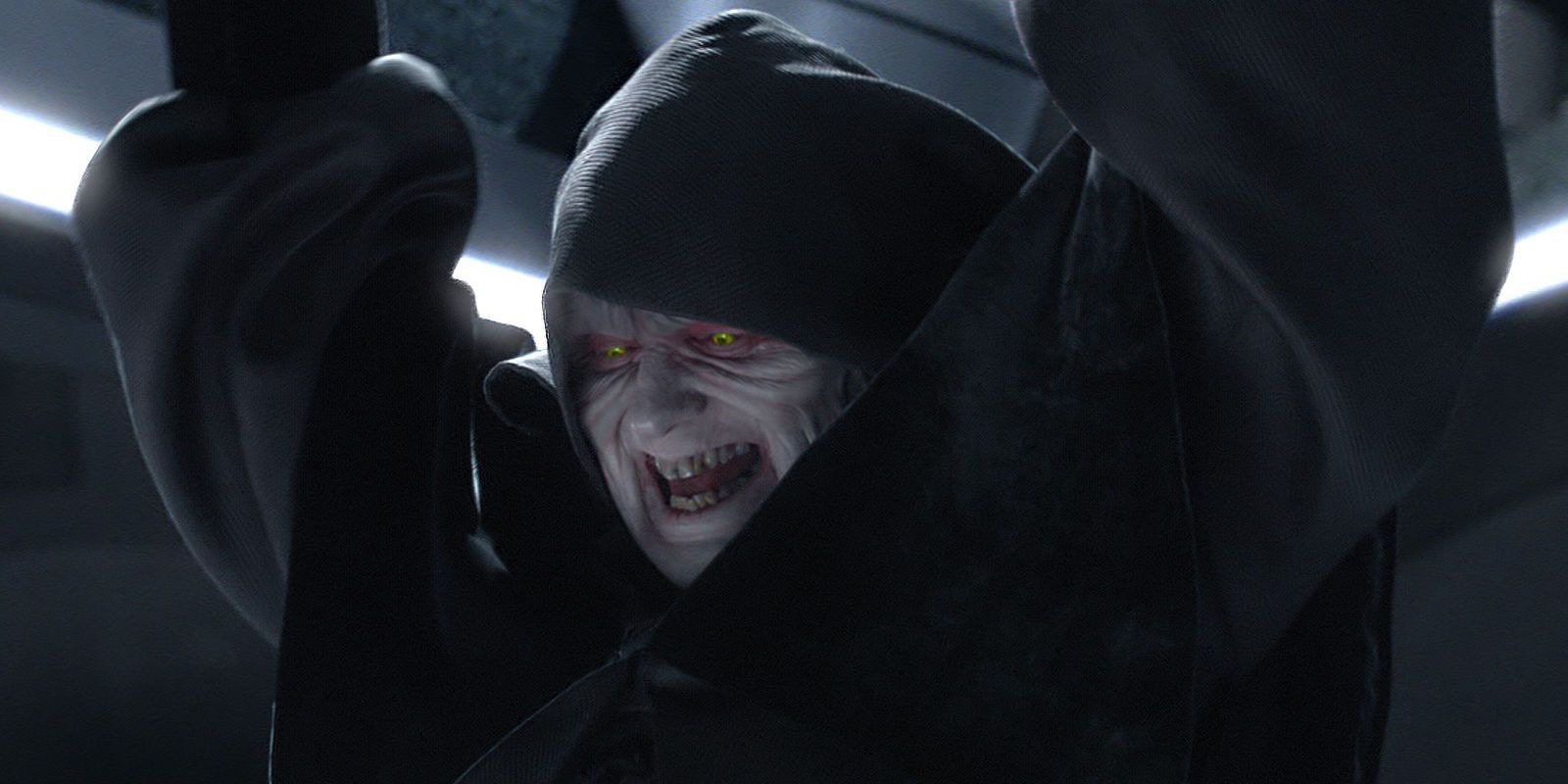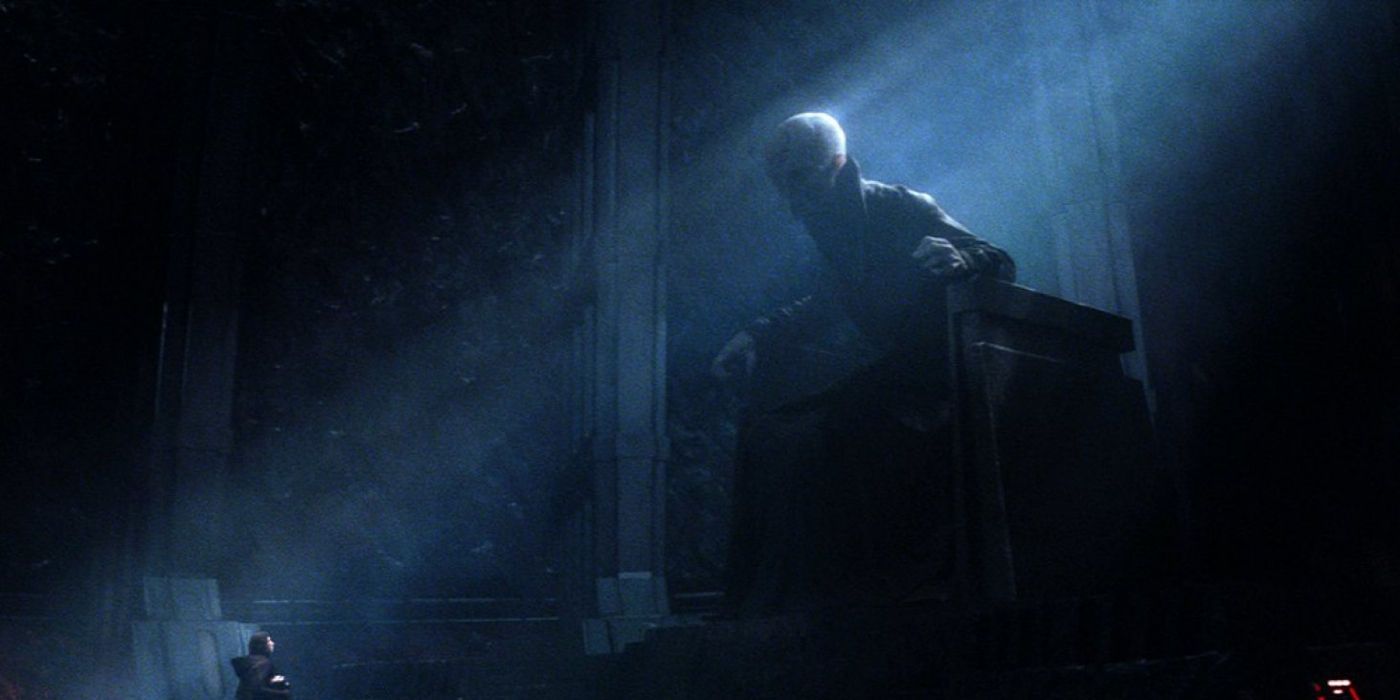[WARNING: This post contains SPOILERS for Aftermath: Life Debt.]
-
One of the biggest questions fans had after seeing Star Wars: The Force Awakens (besides who Rey's parents are) was the "true" identity of Supreme Leader Snoke, leader of the First Order. Though the film doesn't have any major revelations, that didn't stop theories from running rampant in the weeks following its release. Some (such as the Darth Plagueis hypothesis) have been debunked by Lucasfilm. Others still hold water for the time being, at least until Episode VIII hits theaters in December 2017.
As viewers try to unravel the mystery, one of the more popular beliefs is that the Lucasfilm story group is subtly depicting Snoke's rise to power in the non-movie canon materials. A character with a very prevalent presence in the Aftermath series of novels is a shadowy figure known as "The Operator." An admiral in the Empire, the Operator acts as something of a double agent, feeding the New Republic valuable intel so they can eliminate certain Imperials he deems unfit for his new, more efficient Empire. The Operator is a primary player in Aftermath: Life Debt; his name is revealed to be Admiral Gallius Rax, and his actions imply he could be the architect of the First Order. It's a theory that's been going around since the first Aftermath was published last fall, but with the new evidence in Life Debt, we figured it's a good time to analyze how realistic this possibility is.
Admiral Rax's Plan
The epilogue of the first Aftermath was seen by many as a major clue supporting the "Operator is Snoke" theory. In it, the then unnamed fleet admiral describes his vision to Admiral Rae Sloane:
"This is how it must be. The Empire became this... ugly, inelegant machine. Crude and inefficient. We needed to be broken into pieces. We needed to get rid of those who want to see that old machine churning ineluctably forward. It's time for something better. Something new. An Empire worthy of the galaxy it will rule."
Prior to the release of Star Wars 7, one of the few things viewers knew about Snoke was that he witnessed the rise and fall of the old Galactic Empire. It wouldn't be surprising, then, if he was at least partially involved with the Imperials. Based on the Force Awakens novelization, Snoke had knowledge of what specifically caused the downfall of Palpatine (Darth Vader's love for Luke Skywalker), using that as an important lesson for his apprentice Kylo Ren. One of Snoke's goals seems to be honoring the government that came before, while looking for ways to improve upon it. The argument could be made that his mindset is very similar to Admiral Rax, and that may not be by coincidence.
One of Rax's objectives in Life Debt is to form what he calls a "Shadow Council," consisting of a select few former Imperials that he trusts (including Sloane). Interestingly enough, one of the members of this group is Brendol Hux, the father of Force Awakens villain General Armitage Hux (Domhnall Gleeson). Rax views Hux as a vital part of his plan; towards the end of the novel, during a meeting of the Shadow Council, it's revealed that "Hux will be necessary," but the others are considered expendable. The elder Hux's primary specialty was training cadets and forging soldiers in the mold of his design. This isn't too far off from the First Order stormtroopers seen in The Force Awakens; Finn was taken from his family as a small child and essentially brainwashed into believing that the First Order's mission was the right path. If the Empire is to rise again, they obviously need a military force, which is where the Hux family comes in.
Brendol was mentioned by name in Claudia Gray's Bloodline, which in part covers the origins of the First Order. All that book says is that Hux had disappeared following the Battle of Jakku (which is teased in Life Debt), without elaborating further. It is true that Bloodline makes it seem that Centrist senator Lady Carise Sindian spearheaded the First Order, but Rax prefers to lurk in the shadows and stay hidden from the public spotlight. It's possible that he used Sindian to advance his goals, waiting for the opportune moment to strike. Life Debt shows that Rax has maintained a ruse, in which he has hidden "portions of our naval fleet" following the Battle of Endor. There are hundreds of Star Destroyers, thousands of other crafts, and manufacturing plants on other worlds, already making Rax's Empire well-resourced. Bloodline is set just six years before Force Awakens, and it's difficult to believe that they assembled all their materials in that short of time. Rax probably had something to do with it.
Other Evidence
The epilogue of Life Debt (set three decades before the novel's events) is particularly tantalizing. By this point in the book, it has been confirmed that Gallius Rax was a native of the planet Jakku. In his youth, he snuck aboard the Imperialis and was discovered by none other than Emperor Palpatine. The two form a partnership where Rax will have a role and purpose serving the Empire. Palpatine mentions, "I sense in you potential. A destiny. Most people have no destiny." It's been established that the Emperor is rather specific about the people he targets (see: Anakin Skywalker), so he isn't arbitrarily handing out a task for Rax. Gallius' first order of business is to protect a spot on Jakku that Palpatine describes as an area that was "significant a thousand years ago and it will be significant again." What exactly is there is unknown, but it's certainly attention-grabbing.
Neither of the Aftermath books imply that Rax is Force sensitive, which Snoke is ("There's been an awakening. Have you felt it?"). However, that could be an aspect of the character Lucasfilm is holding off on revealing for now. Establishing that Rax had a direct relationship with Palpatine is a fascinating angle, and it will be interesting to see if it's a subject touched upon in future publications. Conceivably, Palpatine taught Rax about the Force and how to control it during his reign, as a means of helping a protégé tap into tap into that aforementioned potential. Though Rax calls the Emperor "a monster, and one who made mistakes," he also knows that the Empire gave him a second lease on life. He could feel he owes it to his friend and mentor to rebuild and maintain order in the galaxy.
Author Chuck Wendig is also very careful to not name the species of Rax. Longtime Star Wars purists know that the Empire, out of racist tendencies, preferred to offer positions to humans. The only clues regarding Rax's physical appearance comes when Sloane is examining an image depicting a young Rax meeting with Imperial higher-ups. "The boy looks like a dirt-cheeked rube shoved into an ill-fitting academy uniform. His hair is dark, his skin pale." This suggests that Rax is human, or at the very least, humanoid. The character's Wookieepedia page is very skim on details, and fails to mention any attributes other than the fact that he is male. It is currently unknown if he is human or alien, meaning that it's something Lucasfilm is saving for another time. Perhaps the third and final book in the Aftermath trilogy, Empire's End, will have some more secrets.
At this point, with everything that has unfolded in the two Aftermath books, Rax seems like too important of an individual to just be a random officer looking to rebuild the Empire. Many would consider it anticlimactic and perhaps even a waste of canon material if Rax and Snoke were not the same. Using a set of novels to show how the Supreme Leader rose to power would be a smart move on the studio's part, and an ideal illustration of how the various Star Wars mediums can work together. The circumstances surrounding Snoke's ascension are irrelevant for the stories the new movies are telling (save for maybe a line of two of dialogue), but it's still a compelling narrative. Of course, the books aren't required reading to enjoy the films, but those who choose to pick them up will have an enhanced understanding of everything that happened.
Conclusion
Rax being Snoke is a development that does make some sense, and there's enough there in the new canon to support the claim. It may not rival "I am your father" for the franchise's best twist, but it's still an engaging tale to follow and allows the books to contribute something substantial of value to the series as a whole. And besides, Star Wars villains have long had a history of adopting new titles at some point in their life. It wouldn't be out of the question for Gallius Rax to give himself a different name when his rise to the top was complete.
All that said, this is still just one possible theory (though, a stronger one than most). Lucasfilm could have something else planned that they'll share when the time is right. They seem to be building towards something major with the Aftermath trilogy, and the title Empire's End seems to imply the undesirable remnants of Palpatine's Empire will be washed away by its conclusion, paving the way for Rax's vision to take shape. Building something more stronger and efficient than what was defeated by the Rebel Alliance appears to be the mission of both, so they very well could be the same individual. Only time will tell.
-
Rogue One: A Star Wars Story opens in U.S. theaters on December 16, 2016, followed by Star Wars: Episode VIII on December 15, 2017, the Han Solo Star Wars Anthology film on May 25, 2018, Star Wars: Episode IX in 2019, and the third Star Wars Anthology film in 2020.






